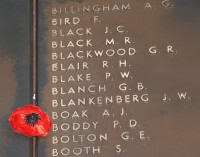John William Blankenberg
| Born | 1891 |
|---|---|
| Place | Riga, Latvia |
| Ethnic origin | German / Latvian? |
| Religion | Lutheran |
| Mother | Nathalia Blankenberg |
| Residence before enlistment | Melbourne |
| Occupation | AB Seaman |
Service #1
| Service number | 4363 |
|---|---|
| Enlisted | 18.01.1916 |
| Place of enlistment | Melbourne |
| Unit | 24th Battalion |
| Rank | Private |
| Place | Western Front, 1916-1918 |
| Casualties | WIA 1918 |
| Awards | MM (7.10.18 LG) |
| Final fate | KIA 5.10.1918 |
| Cemetery | 444 Calvaire Cemetery, Montbrehain, France |
Materials
Digitised service records (NAA)
Digitised Embarkation roll entry (AWM)
Blog articles
From Russian Anzacs in Australian History:
Another hero of these months was John William Blankenberg, a former seaman of German origin from Riga. In March 1918 he had been gassed when his 24th Battalion came under mustard-gas attack. Soon after rejoining his unit, he took part in the attack on Ville-sur-Ancre, near Albert, on the night of 19 May [1918], during which 'he showed a total disregard of all danger' and 'outstanding gallantry', according to the citation for his Military Medal. It stated: 'he was always found on the forefront of the fighting with his platoon officer. When the attacking party was temporarily held up and casualties inflicted by an enemy machine gun he threw a bomb into the post and then helped two of our wounded out of danger. When his party advanced again he helped his officer to rush another post, put the crew out of action and captured a gun.'
The same incidents featured in Bean's Official History: '[Lieutenant] Edgerton and his batman, a Russian named Blankenberg, at once threw bombs in the direction of the sound and half a dozen stick-grenades burst about them in reply. Four men were wounded ...'. Again, when 'Edgerton with his batman as companion' were out on reconnaissance, they came upon a German post; they 'had only one bomb left; but he took the chance, threw the bomb, and, under cover of its burst, dashed for the post. When he was five yards away the Germans began to put out their heads again. The first was shot by Edgerton and his Russian, and the remainder surrendered. ... Edgerton sent [back] the prisoners and the machine-gun in charge of Blankenberg.'
The citation also mentioned some additional mopping-up Blankenberg assisted in when daylight came up, which resulted in the capture of a second gun. Blankenberg had reason to be merciless towards the enemy, according to a letter he wrote to his Australian girlfriend: during the war one of his brothers, he said, was 'shot, another wounded, third and mother burnt, as their village was burnt'. Although the award was made, Blankenberg did not live long enough to receive his medal; he was killed in October. Eric Edgerton, the young officer he served as batman, a university student, was killed in August 1918.
Gallery

AWM memorial panel 101
 Russian Anzacs
Russian Anzacs